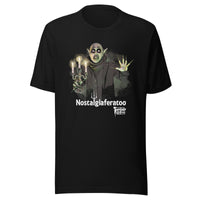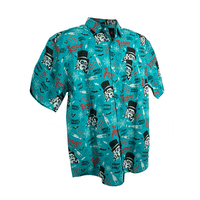The Big Valley, Neil Diamond, Diddy and body slams: the curious connections of ''Brother Love''
Is there a way Robert Goulet inspired a classic Hulk Hogan villain?

Robert Goulet looks much different without the mustache, but you recognize his buttery baritone immediately. It's the opening scene of episode No. 53 of The Big Valley. The year was 1967, in Goulet's clean-shaven, pre-whiskers era. (He grew his 'stache, like so many American men, at the dawn of the Seventies.)
"Share it with me, brother," Goulet croons, pumping away on a rickety organ and stomping a kick drum. "It's a beautiful day!"
The song, "Brotherly Love," was written by Dean Kay and Hal Blair, both big names. Kay penned "That's Life" for Sinatra; the more country-tinged Blair wrote "I'm Yours" for Elvis and "Ringo," a No. 1 hit in 1964 for Bonanza star Lorne Greene.
Anyway, the episode, "Brother Love" revolves around Goulet's itinerant evangelist character, who is later, inevitably, revealed to be a conman. The preacher wanders from town to town in his yellow wagon healing the sick and mute. Only the sick and mute (one of whom is played by Gavin MacLeod, who has more hair than you remember) are in on the scam. Audra Barkley (Linda Evans) falls for the handsome healer.
Western fans perhaps had a whiff of familiarity then, when two years later, Neil Diamond scored a Top 40 hit with "Brother Love's Traveling Salvation Show," the first cut on his 1969 album of the same name. Diamond, hot off romantic smashes like "Cherry, Cherry" and "Girl, You'll Be a Woman Soon," took an unexpected turn on the track.
"You could hear yourself sweat, he walks in / Eyes black as coal," Diamond sings. "And when he lets go / Half the valley shakes."
That "valley" in there perks up our ears. Could it have been mere coincidence that Diamond wrote a song about a Brother Love not long after The Big Valley aired "Brother Love"? Diamond, who got into hot water with conservative Christians over the song, explained that he was inspired to write the song after attending a spine-tingling tent revival. But that "Brother Love" character had to come from somewhere. Even the album cover, which depicts Diamond sitting on the buckboard of a wagon, brings to mind Goulet's transportation in that episode.
The idea of Brother Love would continue to trickle down into strange arenas over the following decades. In the 1980s, a Brother Love literally entered arenas in the World Wrestling Federation. A villain of Hulk Hogan's, Brother Love seemed perpetually sunburned and sweaty. The smarmy character, portrayed by Bruce Prichard, was based on the televangelists of the era, and served as a manager to the heels of the WWF. "I love you!" he would declare through his fake, gleaming smile.
It certainly seems possible that Prichard pulled the character from the Neil Diamond song. Although, by then, the moniker "Brother Love" had more meaning. It was one of the aliases of separatist leader Yahweh ben Yahweh, a.k.a. Hulon Mitchell Jr., a.k.a. Hulah Shah, a.k.a. Father Michel. He founded the new religious movement the Nation of Yahweh in late 1970s. In 1991, he was convicted of conspiring to murder.
Speaking of aliases, "Brother Love" made headlines earlier this year when Sean "Diddy" Combs, formerly known as Puff Daddy and P. Diddy, announced he was changing his name to "Brother Love." He later backtracked and said he was "only joking," though on Jimmy Kimmel Live! the music mogul reiterated that he now answers to the name "Love."
So, did this chain of events all start with The Big Valley? We can not prove it, but we like to think so. Clear evidence of a direct link between the Robert Goulet character and the rapper behind "I'll Be Missing You" might not be there, but it just takes a little faith in the power of classic television.








2 Comments













































